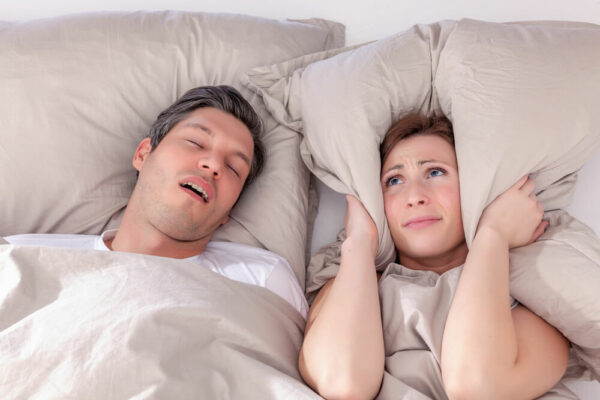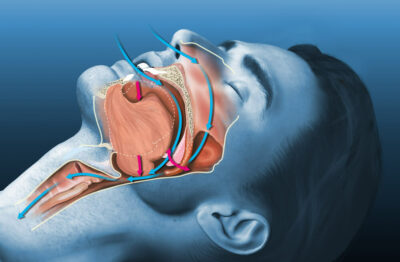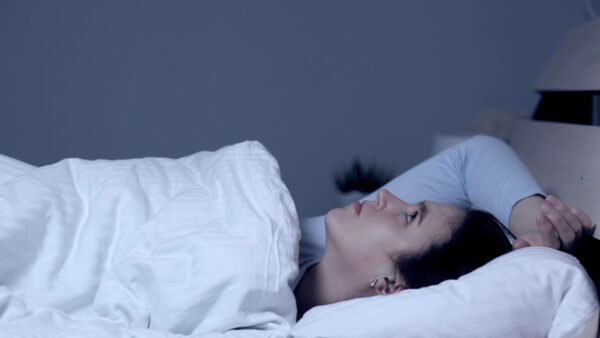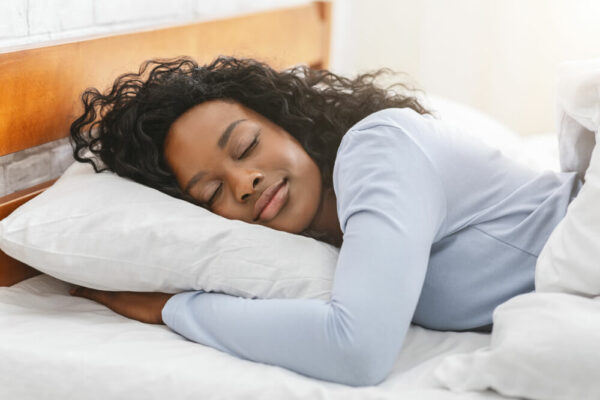Sleep apnea is a common, chronic condition that can drastically affect quality of life. It affects more than 22 million Americans. Unfortunately, many people are unaware that they suffer from sleep apnea. Luckily, dentists can screen for sleep apnea — and in many cases, can provide oral appliances for their patients to combat the condition.
Sleep Apnea: The Basics
 Sleep apnea comes in two varieties: obstructive and central. Both forms cause interruption to normal breathing patterns during sleep cycles — and compromised breathing should never be taken lightly.
Sleep apnea comes in two varieties: obstructive and central. Both forms cause interruption to normal breathing patterns during sleep cycles — and compromised breathing should never be taken lightly.
The more common form of sleep apnea is obstructive sleep apnea, which makes up 80 percent of sleep apneas. As the patient sleeps, the soft tissue of the airway collapse, preventing proper oxygen intake to the lungs.
Central sleep apnea is not characterized by any physical disruption to breathing. Instead, the brain ceases to send messages to the body to breathe during sleep. The body, in turn, reacts as if there has been an obstruction in the airway.
 Central sleep apnea is linked to various types of nervous system dysfunction, such as in patients recovering from a stroke or suffering with neuromuscular disease, such as ALS. Patients with congestive heart failure or other heart and lung diseases also frequently exhibit central sleep apnea.
Central sleep apnea is linked to various types of nervous system dysfunction, such as in patients recovering from a stroke or suffering with neuromuscular disease, such as ALS. Patients with congestive heart failure or other heart and lung diseases also frequently exhibit central sleep apnea.
What Happens to My Body During Sleep Apnea?
Both obstructive and central sleep apnea can cause serious disruption to a person’s sleep. Often, a patient is only aware of a sense of having slept poorly, without a realization that sleep apnea is involved. But without treatment, sleep apnea can wreak havoc on mental and physical health, both short-term and long-term.
When the body experiences an interruption to the normal sleep breathing cycle, the heart rate tends to decrease. As your body’s oxygen intake decreases, involuntary reflexes may kick in, causing the sufferer to be startled awake with a gasp or loud snore. When this happens, the heart rate shoots up, along with the blood pressure.
If this happens regularly, blood pressure will stay high and the walls of the heart can even thicken from the dysfunctional pattern. The heart can then become less efficient in pumping blood through the body, and there is also a risk of developing atrial or ventricular arrhythmias.
The Risks of Untreated Sleep Apnea
One study showed that adults with sleep apnea are almost twice as likely to have high blood pressure. They’re also doubly at risk for heart disease, depression, and bipolar disorder, as well as 2.5 times more likely to develop diabetes. Sleep apnea has also been linked to obesity, as well as strokes. Untreated sleep apnea can also cause dangerous chronic fatigue, which has been linked to increased fatality in drivers.
Who Is Susceptible to Sleep Apnea?
Sleep apnea is remarkably common, appearing in approximately 25 percent of men and almost 10 percent of women. Sleep apnea is more prevalent in people over 50 and in those who are overweight. It’s not just adults, though: Babies and children can also experience sleep apnea.
How Your Dentist Can Help Assess Sleep Apnea Risk

Your dentist is your best friend in the fight against sleep apnea. Dentists pay close attention to obstructive sleep apnea (OSA) risk factors or presenting features, such as large neck circumference or a large tongue or tonsils. Your dentist will also ask if you’ve experienced any sense of choking or gasping during sleep or upon waking, or if you know you snore. Your bed partner might have mentioned noticing you taking strange pauses as you breathe while asleep — that information is also very help in diagnosing sleep apnea.
If your dentist suspects sleep apnea, she or he may refer you to your primary care doctor or to a sleep specialist for further assessment. Your dentist can also help you understand your options, such as wearing oral appliances or devices to bed to minimize sleep apnea symptoms and improve quality of sleep. Oral appliances — or mandibular advancement devices — are often effective for patients of normal weight who present with mild to moderate sleep apnea, although heavier patients with more serious cases of apnea may require additional treatment. The appliances resemble mouthguards and serve to nudge the lower jaw forward, preventing the airway from collapsing during sleep.
If you’re not a good candidate for a mandibular advancement device, your dentist may recommend a tongue-retaining device, which holds the tongue in a forward position to maintain normal breathing at night.
Whichever device is prescribed, dentists will monitor patients to make sure they’re adjusting comfortably to the appliance. Proper fit is key to comfortable, successful treatment.
Sleep apnea can also be treated with a continuous positive airway pressure (CPAP) machine.
How Is Sleep Apnea Diagnosed?
Your dentist will work together with your primary doctor to come to a sleep apnea diagnosis. You may be asked to participate in an overnight sleep study, known as a polysomnogram, or PSG. The test is painless and measures body functions such as breathing patterns, airflow, and electrical activity of the brain. If you take a PSG, you will learn how many times during a sleep cycle that your breathing became impaired, and your sleep apnea will be graded in severity.
Talk to Your Dentist If You Are Having Any of These Potential Sleep Apnea Symptoms
- Daytime fatigue or drowsiness
- Snoring
- Sore throat or dry mouth first thing in the morning
- Unexplained mood disturbances
- Night sweats not otherwise explained
- Headaches
- Sudden awakenings from sleep while gasping for air
- Frequent nighttime awakenings
Sleep apnea can present differently in children, with symptoms such as:
- “Sucking in” of air, with ribcage becoming sunken on inhalation
- Daytime breathing through mouth
- Odd sleeping positions (hyperextended neck, sleeping on hands and knees)
- Hyperactivity or drowsiness, especially in school settings
Schedule Your Sleep Apnea Dental Assessment Visit
 Here at Dr. Lance Johnson Family Dentistry, we want to make sure you’re getting the best sleep you can — for you and your heart health. We’d be happy to talk to you about your risk factors for sleep apnea, and we make all of our sleep apnea oral appliances in-house. Your comfortable, custom mouthpiece will keep your airway open and stop loud snoring, ensuring a far more pleasant night’s sleep for you (and your partner!).
Here at Dr. Lance Johnson Family Dentistry, we want to make sure you’re getting the best sleep you can — for you and your heart health. We’d be happy to talk to you about your risk factors for sleep apnea, and we make all of our sleep apnea oral appliances in-house. Your comfortable, custom mouthpiece will keep your airway open and stop loud snoring, ensuring a far more pleasant night’s sleep for you (and your partner!).
